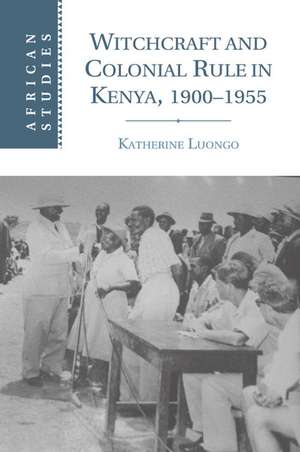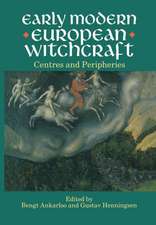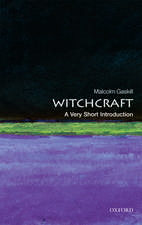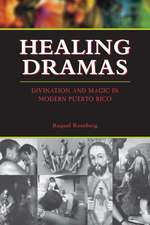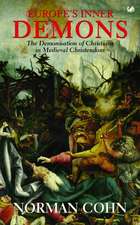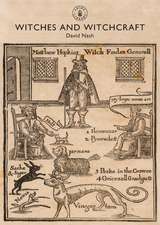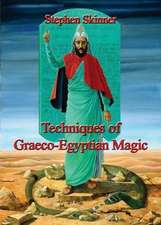Witchcraft and Colonial Rule in Kenya, 1900–1955: African Studies, cartea 116
Autor Katherine Luongoen Limba Engleză Paperback – 20 mai 2015
Din seria African Studies
-
 Preț: 177.35 lei
Preț: 177.35 lei -
 Preț: 178.45 lei
Preț: 178.45 lei - 9%
 Preț: 731.14 lei
Preț: 731.14 lei -
 Preț: 275.85 lei
Preț: 275.85 lei -
 Preț: 204.11 lei
Preț: 204.11 lei -
 Preț: 202.11 lei
Preț: 202.11 lei -
 Preț: 223.29 lei
Preț: 223.29 lei -
 Preț: 310.62 lei
Preț: 310.62 lei -
 Preț: 342.31 lei
Preț: 342.31 lei - 11%
 Preț: 696.80 lei
Preț: 696.80 lei -
 Preț: 184.93 lei
Preț: 184.93 lei -
 Preț: 238.11 lei
Preț: 238.11 lei -
 Preț: 177.35 lei
Preț: 177.35 lei -
 Preț: 208.26 lei
Preț: 208.26 lei - 23%
 Preț: 326.14 lei
Preț: 326.14 lei - 15%
 Preț: 459.92 lei
Preț: 459.92 lei - 15%
 Preț: 295.49 lei
Preț: 295.49 lei - 13%
 Preț: 296.11 lei
Preț: 296.11 lei - 18%
 Preț: 1001.24 lei
Preț: 1001.24 lei -
 Preț: 439.78 lei
Preț: 439.78 lei -
 Preț: 446.37 lei
Preț: 446.37 lei - 12%
 Preț: 301.75 lei
Preț: 301.75 lei - 25%
 Preț: 770.26 lei
Preț: 770.26 lei -
 Preț: 110.05 lei
Preț: 110.05 lei -
 Preț: 486.80 lei
Preț: 486.80 lei - 18%
 Preț: 1106.02 lei
Preț: 1106.02 lei -
 Preț: 480.24 lei
Preț: 480.24 lei - 18%
 Preț: 998.56 lei
Preț: 998.56 lei - 18%
 Preț: 182.41 lei
Preț: 182.41 lei - 18%
 Preț: 995.09 lei
Preț: 995.09 lei - 18%
 Preț: 703.45 lei
Preț: 703.45 lei -
 Preț: 322.12 lei
Preț: 322.12 lei -
 Preț: 489.10 lei
Preț: 489.10 lei -
 Preț: 477.72 lei
Preț: 477.72 lei - 25%
 Preț: 853.03 lei
Preț: 853.03 lei - 18%
 Preț: 179.93 lei
Preț: 179.93 lei - 26%
 Preț: 762.16 lei
Preț: 762.16 lei -
 Preț: 321.93 lei
Preț: 321.93 lei - 18%
 Preț: 710.05 lei
Preț: 710.05 lei -
 Preț: 273.50 lei
Preț: 273.50 lei - 16%
 Preț: 311.03 lei
Preț: 311.03 lei -
 Preț: 287.48 lei
Preț: 287.48 lei -
 Preț: 286.69 lei
Preț: 286.69 lei
Preț: 285.16 lei
Nou
Puncte Express: 428
Preț estimativ în valută:
54.56€ • 56.97$ • 45.06£
54.56€ • 56.97$ • 45.06£
Carte tipărită la comandă
Livrare economică 15-29 aprilie
Preluare comenzi: 021 569.72.76
Specificații
ISBN-13: 9781107529847
ISBN-10: 1107529840
Pagini: 264
Ilustrații: 4 b/w illus. 3 maps
Dimensiuni: 153 x 230 x 15 mm
Greutate: 0.39 kg
Editura: Cambridge University Press
Colecția Cambridge University Press
Seria African Studies
Locul publicării:New York, United States
ISBN-10: 1107529840
Pagini: 264
Ilustrații: 4 b/w illus. 3 maps
Dimensiuni: 153 x 230 x 15 mm
Greutate: 0.39 kg
Editura: Cambridge University Press
Colecția Cambridge University Press
Seria African Studies
Locul publicării:New York, United States
Cuprins
1. Introduction; 2. Clans and councils, caravans and conquest, cosmology and colonialism: Ukambani in the late nineteenth and early twentieth centuries; 3. Understanding uoi, uwe, and kithitu in Ukambani; 4. The 'cosmology' of the colonial state; 5. The Wakamba witch trials: a witch-murder in 1930s Kenya; 6. Witchcraft, murder, and death sentences after Rex v. Kumwaka; 7. The world of oathing and witchcraft in Mau Mau-era machakos; 8. Cleansing Ukambani witches; 9. Epilogue.
Recenzii
'This is one of the finest historical ethnographies of witchcraft and statecraft that I have read. Luongo simultaneously gives account of Kamba witchcraft and of the British colonial juridical system through which it was policed - two cosmologies that not only came into conflict but that also profoundly shaped one another over time. The rich detail of the work - a reading of the archives at once anthropological and historical - makes for captivating reading and, in light of the continuing, sometimes explosive, juxtaposition of witchcraft and formal legal systems in postcolonial East Africa and beyond, a work of significant contemporary relevance.' Harry G. West, SOAS, University of London
'Where witchcraft is very often taken to be a peculiar aspect of Africans' mentality, Luongo's fine book shows how the occult was translated, disciplined, and organized by British and Kenyan brokers. The regulation of witchcraft was one of the tensions of empire, an occupation in which Kenyan practitioners played a role alongside British authorities. Luongo's book allows us to see how witches haunted colonial power, giving us new insights into the uncertainties of governance.' Derek Peterson, University of Michigan, and author of Creative Writing: Translation, Bookkeeping, and the Work of Imagination in Kenya
'Luongo's vivid style of anthropological history brings out the full complexity of colonial officials' positioning toward the witchcraft conundrum. But the interest of this groundbreaking study is much broader. Luongo's imaginative analysis of rich legal data and people's memories shows witchcraft to be an ongoing, basic challenge to state formation as such, up to the present day.' Peter Geschiere, University of Amsterdam, and author of The Modernity of Witchcraft: Politics of the Occult in Postcolonial Africa
'Through its analysis of judicial matters concerning witchcraft, this book makes an important contribution to understandings of the construction of both the colonial and postcolonial state. It illustrates the reliance of an anthropological history on legal research.' Hervé Maupeu, Université de Pau et des Pays de l'Adour
'… forces readers to re-imagine the construct of law and perceptions of order in relation to empire and will undoubtedly become essential reading for Africanist scholars of various specialities.' Reviews in History (history.ac.uk/reviews)
'Where witchcraft is very often taken to be a peculiar aspect of Africans' mentality, Luongo's fine book shows how the occult was translated, disciplined, and organized by British and Kenyan brokers. The regulation of witchcraft was one of the tensions of empire, an occupation in which Kenyan practitioners played a role alongside British authorities. Luongo's book allows us to see how witches haunted colonial power, giving us new insights into the uncertainties of governance.' Derek Peterson, University of Michigan, and author of Creative Writing: Translation, Bookkeeping, and the Work of Imagination in Kenya
'Luongo's vivid style of anthropological history brings out the full complexity of colonial officials' positioning toward the witchcraft conundrum. But the interest of this groundbreaking study is much broader. Luongo's imaginative analysis of rich legal data and people's memories shows witchcraft to be an ongoing, basic challenge to state formation as such, up to the present day.' Peter Geschiere, University of Amsterdam, and author of The Modernity of Witchcraft: Politics of the Occult in Postcolonial Africa
'Through its analysis of judicial matters concerning witchcraft, this book makes an important contribution to understandings of the construction of both the colonial and postcolonial state. It illustrates the reliance of an anthropological history on legal research.' Hervé Maupeu, Université de Pau et des Pays de l'Adour
'… forces readers to re-imagine the construct of law and perceptions of order in relation to empire and will undoubtedly become essential reading for Africanist scholars of various specialities.' Reviews in History (history.ac.uk/reviews)
Notă biografică
Descriere
This book develops an ethnography of Kamba witchcraft and its contentious relationship with the state in colonial Kenya.
